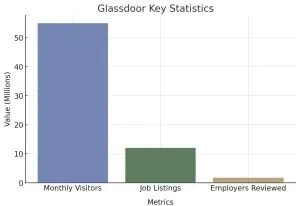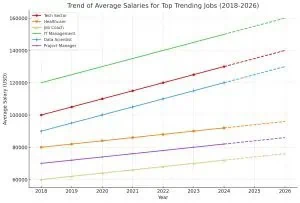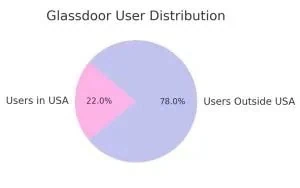
The Ultimate Guide to Glassdoor
Introduction
In a world where job seekers navigate a sea of opportunities and employers vie for top talent, understanding the dynamics of the job market is more crucial than ever. Enter Glassdoor, the standard of transparency in this complex landscape. Since its launch in 2008, Glassdoor has radically transformed how people search for jobs and how companies are perceived. This guide delves into the remarkable journey of Glassdoor, exploring its inception, impact, and challenges. From providing candid employee reviews to influencing employer branding and policy changes, Glassdoor’s role in reshaping the modern job market is profound and undeniable.
Whether you’re a job seeker, a company representative, or fascinated by the evolution of workplace dynamics, this comprehensive exploration of Glassdoor offers valuable insights into a platform that has become integral to our understanding of work culture and employment practices today.
Revolutionizing Job Search and Company Transparency
The Genesis of Glassdoor From an Accidental Idea to a Global Platform
In the pre-internet era, job seekers relied on newspapers, local ads, and word-of-mouth for career opportunities. However, the launch of Glassdoor in 2008 marked a significant shift. Co-founded by Tim Besse, Robert Hohman, and Rich Barton, Glassdoor emerged from a simple yet transformative idea. The inception occurred when Barton inadvertently left employee survey data on a printer, sparking a discussion about the potential benefits of publicly sharing such information. This incident created a platform where employees could anonymously submit reviews about companies, their experiences, salaries, and workplace environments.
A New Era of Job Market Transparency
Glassdoor was more than just a job search portal; it was a pioneer in promoting workplace transparency. The platform allowed users to post or search for jobs alongside reviewing their companies. This groundbreaking approach enabled job seekers to make informed decisions based on employee experiences. Glassdoor’s rapid growth reflected its impact, with over 60,000 salary reports and company reviews for more than 11,000 employers across 80 countries within months of its launch.
Early Achievements and International Expansion
Glassdoor’s unique value proposition quickly garnered recognition. In August 2008, just two months after its launch, PC Mag listed it among the top 100 undiscovered websites. This accolade highlighted its innovative approach to salary transparency and employer reviews. Additionally, acknowledging the global demand for such a platform, Glassdoor expanded its services to over 100 countries, providing salary details in local currencies, further strengthening its international presence.
Mission and Vision of Glassdoor
Fostering Informed Career Decisions: Glassdoor’s Core Mission
At its heart, Glassdoor was founded with a compelling mission: “To help people everywhere find a job and company they love.” This mission reflects a commitment to empowering job seekers with crucial information that goes beyond mere job listings. Glassdoor’s approach has always provided a holistic view of the workplace, including the culture, compensation, and real employee experiences. It enables individuals to find careers that align with their aspirations and values.
Visionary Approach: Transparency and Authenticity in the Workplace
Glassdoor’s vision extends beyond the individual job seeker to encompass a broader goal of fostering transparency and authenticity in the workplace. By allowing anonymous reviews, Glassdoor has opened the door for honest and candid discussions about companies, their management practices, and workplace environments. This transparency is beneficial for prospective employees and a powerful tool for companies to build trust and improve their employer branding.
Core Offerings of Glassdoor
More Than Just Reviews: A Wealth of Resources for Job Seekers
Glassdoor’s diverse core offerings cater to various aspects of job searching and career planning. Its platform includes:
- Company Reviews: Employees and former employees anonymously share their experiences, providing insights into company culture, management, and work-life balance.
- Salary Data: Detailed salary information for various positions across industries, offering a transparent look at compensation trends and expectations.
- Interview Insights: Real interview experiences and questions shared by job applicants, helping others prepare for their own interviews.
- Job Listings: A comprehensive job search tool that allows users to find opportunities based on their skills, experience, and preferred company culture.
A Comprehensive View of the Job Market
By integrating these features, Glassdoor offers a more comprehensive view of the job market than traditional job search websites. Users can research potential employers, understand market-standard salaries, and prepare effectively for interviews, all on a single platform.
Impact of Glassdoor on the Job Market
Revolutionizing Job Search and Employer Transparency
Glassdoor’s effect on the job market has been multifaceted. It has revolutionized how job seekers approach their career moves, equipping them with vital information previously unavailable. This transparency has shifted the power dynamics in the job search process, empowering candidates to make informed decisions.
Influencing Employer Branding and Corporate Culture
Beyond aiding job seekers, Glassdoor has significantly influenced employer branding. Companies are now more aware of their online reputation and increasingly use Glassdoor feedback to shape their policies and workplace culture. This shift towards greater transparency and responsiveness in employer practices is a testament to Glassdoor’s profound impact on the modern job market.
Glassdoor’s Rise and Impact
Shifting the Power: From Information Asymmetry to Employee Voice (2007-2013)
The Pre-Glassdoor Job Market: A Landscape of Secrecy and Control
Before Glassdoor’s emergence, the job market was characterized by information asymmetry, where employers held most of the cards. Job seekers had limited access to authentic information about companies, their cultures, and compensation. This imbalance often left candidates at a disadvantage during job searches and negotiations.
Democratizing Workplace Information: The Advent of Glassdoor
Glassdoor’s launch in 2008 marked a significant shift in this dynamic. By enabling anonymous reviews from employees and former employees, the platform democratized access to information that was previously shrouded in secrecy. This change gave job seekers insights into company cultures, management practices, and salary structures, allowing them to make more informed decisions.
The Impact of Employee Reviews and Salary Transparency
The introduction of employee reviews on Glassdoor profoundly impacted the job market. Candid insights about workplace realities, from management styles to compensation fairness, were readily available for the first time. These reviews informed job seekers and pressured companies to address internal issues, leading to shifts in company culture and practices.
Case Study: Company X’s Response to Negative Reviews
A company referred to as “Company X” faced a significant drop in its Glassdoor rating following a major downsizing event. To improve its reputation, Company X embarked on a two-pronged strategy. Firstly, the HR department flagged 1-star reviews for potential removal on Glassdoor. Secondly, they initiated efforts to encourage a wave of new 5-star reviews, leveraging HR initiatives and company events to foster a positive atmosphere. This approach was practical, and within just two months, Company X saw its Glassdoor rating improve from 2.3 to 2.8, aiming to surpass the 3.0 mark.
This case study reveals the dynamic interaction between companies and Glassdoor reviews, highlighting how companies can actively manage their online reputation. It also raises questions about the impartiality of Glassdoor’s review process.
Beyond Reviews: Data, Insights, and Employer Engagement (2014-present)
More Than Just Employee Reviews
As Glassdoor evolves, its offerings expand beyond employee reviews. The platform started aggregating data on job listings, salary trends, and employer branding, becoming a comprehensive resource for job seekers and employers. This expansion provides deeper insights into the job market and helps companies understand and engage with their potential and current employees.
The Glassdoor Effect: Shaping Employer Branding and Talent Attraction
The “Glassdoor effect” significantly influenced employer branding. Companies began to realize the impact of online reviews on their ability to attract and retain talent. This awareness led to changes in policies and practices, focusing on improving employee satisfaction, engagement, and public perception.
Glassdoor and Pay Transparency
One notable area where Glassdoor had a substantial impact was pay transparency. The platform’s salary data challenged the taboo around discussing compensation, prompting a shift towards more open conversations about pay. This transparency helped address wage gaps and compensation fairness issues, encouraging companies to reassess and justify their pay structures.
Popular Job Searches on Glassdoor
Reflecting current market trends, Glassdoor has identified some of the most searched jobs, showcasing a varied interest across sectors. These include Customer Relations, highlighting the value of client engagement in business; Software Engineer, indicating the ongoing demand in tech; Registered Nurse, a testament to the critical need in healthcare; and Data Analyst, representing the growing importance of data-driven decision making in various industries. This insight from Glassdoor provides a snapshot of the dynamic job market and evolving career interests.
Challenges and Controversies
Concerns About Review Accuracy and Fairness
The Complexity of Authentic Reviews
Glassdoor’s platform, which relies on anonymous reviews, often raises questions about the accuracy and fairness of its content. Instances of companies manipulating their reviews, either by flagging negative reviews for removal or encouraging a flood of positive reviews, have been reported. This manipulation can skew a potential job seeker’s perception of a company, leading to concerns about the reliability of the information presented on Glassdoor.
The Dilemma of Negative Review Removal
Cases have been noted where negative reviews were removed from Glassdoor, raising questions about the platform’s review moderation policies. Users reported their negative reviews being taken down quickly, even when they believed these reviews did not violate any community guidelines. This has led to skepticism about the impartiality of the review process and the influence of companies on the content that remains visible on the site.
Impact of Glassdoor Reviews on Corporate Policies
Research conducted by Professor Chenqi Zhu and Assistant Professor Svenja Dube focused on the influence of Glassdoor reviews on corporate policies, particularly concerning workplace culture, employee relations, and diversity and inclusion. The study analyzed various firms’ workplace policies before and after receiving their first Glassdoor review. The researchers used the KLD rating to measure a firm’s workplace policies and employee friendliness. They found that companies improved their policies on work-life balance, compensation & benefits, and employee diversity and inclusion following exposure to Glassdoor reviews. These improvements were especially pronounced in labor-intensive firms, where attracting talent is crucial. This research underscores the significant impact of Glassdoor reviews on corporate policies, demonstrating how public feedback can lead to fundamental changes in company practices and culture.
Legal Challenges and Glassdoor’s Response
Glassdoor’s Efforts to Maintain Review Integrity
Despite the challenges, Glassdoor asserts that they have mechanisms to ensure reviews’ integrity. The platform employs technological checks and a content management team to verify that each review comes from actual employees. However, the effectiveness of these measures has been debated among users and companies alike.
Balancing Transparency with Legal Obligations
Glassdoor has faced legal challenges, including issues related to defamation and privacy. The platform has to navigate the delicate balance between maintaining transparency and adhering to legal standards. Glassdoor’s approach to handling such challenges has encouraged employers to engage with reviewers, allowing them to respond to reviews and present their side of the story.
Ethical Considerations in Anonymous Reviews
The Ethics of Anonymity
The anonymous nature of Glassdoor reviews presents ethical considerations. While it allows employees to share honest feedback without fear of retaliation, it also opens the door for potential misuse. Unfounded allegations or overly negative reviews can unjustly harm a company’s reputation.
Employer Responses and Their Impact
Employers are encouraged to interact with reviews on Glassdoor. How companies respond to both positive and negative reviews can significantly impact their employer brand and public image. The quality of these interactions is crucial, as it reflects the company’s attitude towards feedback and its commitment to addressing employee concerns.
Glassdoor’s Future in Shaping the Job Market
Glassdoor’s Current Market Position and Future Potential
Adapting to a Changing Job Market
As part of the Recruit Group alongside Indeed, Glassdoor continues to be a significant player in the job market. The “Hiring and Workplace Trends Report 2023” by Indeed and Glassdoor highlights several trends shaping the future of work, including the continuous impact of tight labor supply on hiring, the enduring nature of remote work, and the increasing importance of benefits in job offers. These trends suggest that Glassdoor must continue adapting its platform to meet these evolving market demands.
Emerging Job Market Trends and Glassdoor’s Adaptation
Embracing Remote Work and Diversity
The trend towards remote work and the growing emphasis on diversity, equity, and inclusion (DEI) in the workplace are vital factors that Glassdoor will likely focus on. With remote work positions constituting a significant portion of job openings, Glassdoor might enhance its features to cater to remote job seekers and employers better. Furthermore, as DEI becomes increasingly essential, especially among younger workers, Glassdoor’s role in promoting transparent DEI policies and practices could become more prominent.
Potential New Features and Services
Innovations in Job Seeking and Company Evaluation
Glassdoor may explore new features such as AI-driven job matching, skill assessments, and personalized job recommendations. These innovations could help job seekers find roles that align more closely with their skills and preferences. Additionally, AI-powered career coaching or enhanced employer branding tools could be potential areas of expansion, aiding job seekers and employers in navigating the job market more effectively.
Shaping the Future of Work
A Leader in Promoting Transparency and Ethical Hiring
As the job market evolves, Glassdoor’s role in promoting transparency, ethical hiring practices, and informed career decisions will likely become even more significant. By continuously adapting to market trends and expanding its services, Glassdoor can maintain its position as a key influencer in shaping a more empowered and informed job market.
FAQ’s
What is Glassdoor and why is it significant?
Glassdoor is a platform where employees can anonymously submit reviews about companies, their experiences, salaries, and work environments. It is significant because it has transformed job searching and company transparency, allowing candidates to make informed decisions based on actual employee experiences.
How did Glassdoor impact the job market?
Glassdoor revolutionized the job market by shifting the power dynamics. It provided transparency, empowering candidates with information about company cultures, management practices, and salary structures, and influenced companies to address internal issues and improve employer branding.
What is Glassdoor’s core mission?
Glassdoor’s core mission is to “help people everywhere find a job and company they love.” The platform empowers job seekers with crucial information about companies, including their culture, compensation, and real employee experiences, enabling individuals to find careers that align with their aspirations and values.
How has Glassdoor influenced employer branding and corporate culture?
Glassdoor has significantly influenced employer branding and corporate culture. Companies are now more aware of their online reputation and using Glassdoor feedback to shape their policies and workplace culture. This shift towards greater transparency and responsiveness in employer practices is a testament to Glassdoor’s profound impact on the modern job market.
What challenges has Glassdoor faced?
Glassdoor has faced challenges such as the accuracy and fairness of anonymous reviews, manipulation of reviews by companies, legal challenges related to defamation and privacy, and ethical considerations regarding the anonymous nature of reviews.
How does Glassdoor maintain the integrity of its reviews?
Glassdoor employs technological checks and a content management team to verify the authenticity of reviews and maintain their integrity. Despite this, the effectiveness of these measures has been a topic of debate.
What future trends is Glassdoor adapting to?
Glassdoor is adapting to trends such as remote work and emphasizing diversity, equity, and inclusion in the workplace. It is exploring new features like AI-driven job matching and personalized job recommendations to cater to evolving market demands.
Conclusion
Reflecting on Glassdoor’s journey, it’s clear that the platform has significantly reshaped the job market. It has empowered job seekers and influenced companies to adopt more transparent and ethical practices. Looking forward, Glassdoor’s commitment to promoting transparency and informed career decisions remains as crucial as ever.
If you’re seeking a transparent, diverse, and inclusive workplace, join Diversity Employment today for more insights and opportunities.












